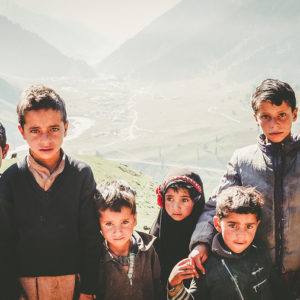It started with lip swelling and throat pain. My nut-allergic preschooler was eating dinner at a local Boston cafe. As a pediatrician, I knew this could be a life-threatening allergic reaction. I called for help and transported her to the nearest emergency room, 10 minutes away. Gradually, with proper medical care, she improved. With that, our nightmare was over.
However, I kept thinking how her outcome could have been drastically different — even fatal — if I were a mother in Kashmir. Born in Indian-administered Kashmir, I immigrated to the United States when I was 15 months old. The political conflict that existed then has only intensified over the last three decades.
Since August 5, the entire Kashmiri population — 12 million people, including 2 million children under 6 — has been under a communications blackout and military lockdown. Internet, cellular services and even landlines are blocked. The British Medical Journal describes the lockdown as a “blatant denial of the right to health care” and the Lancet argues that “the people of Kashmir need healing from the deep wounds of this decades-old conflict, not subjugation to further violence and alienation.”
Those who need medical treatment cannot obtain it. In Kashmir, I would not have been able to get my child treated — our nightmare would have never ended. Indeed, it is an accident of fortune that today I can access a hospital without navigating checkpoints or obtaining a curfew pass. I don’t have to rehearse my story to ensure I convey the right sense of urgency and deference to keep my child, my husband and myself safe. I cannot imagine having to wrestle with such stress, on top of the fear that my child’s airway is rapidly closing. Kashmiri mothers navigate such realities every day.
Children in Kashmir are prevented from accessing urgent medical care. Basic necessities — including baby food, milk and medicines are in short supply. Parents are not sending their children to school for fear they will be injured, detained or killed and have no way of communicating with them. Armed forces have illegally detained Kashmiri children and abused them, physically and sexually.
Children have been shot in the eye by soldiers firing pellet guns and even marble slingshots. A 17-year-old boy recently died of tear gas and pellet gun injuries. Women in labor cannot access obstetric care for safe delivery, putting their newborns at risk. Fathers are randomly detained by the military; many disappear, leaving children behind.
After decades of conflict, Kashmiris already suffer from staggering rates of depression, anxiety and PTSD. For children, direct and indirect trauma exposure causes behavioral and psychological problems. War breaks down parent and child mental health, which are interrelated. The trauma and toxic stress this lockdown and blackout are imposing on Kashmiri children and families is unprecedented and will cause intergenerational harm.
Children’s rights, as outlined in the U.N. Convention on the Rights of the Child, are being violated daily in Kashmir, including the right to health, education, play, an adequate standard of living, access to information, protection from abuse and harm, freedom of thought, and peaceful assembly.
Local children’s organizations are being paralyzed by the blackout and lockdown while international organizations tasked with promoting children’s well-being, like UNICEF and Save the Children, have yet to initiate meaningful programs to address this crisis.
This is not OK. International organizations that focus on children’s health must do more. They must demand an end to the blackout, lockdown and detentions of minors. They must demand that tear gas, pellet guns and violence not be used against children. They can ask that international aid organizations be allowed into Kashmir and develop meaningful partnerships and programming with those on the ground.
Each of us can take action, too. We can start with simple initiatives: educate ourselves, share information about these atrocities on social media, and contact our elected officials.
All children — regardless of skin color, ethnicity, faith or the accident of their birth — deserve to be healthy, to move, to speak and to play freely. In times of political turmoil, it’s easy to forget about children. But if we don’t speak up for them, who will?

